|
|
|
Sort Order |
|
|
|
Items / Page
|
|
|
|
|
|
|
| Srl | Item |
| 1 |
ID:
171303
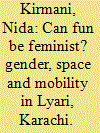

|
|
|
|
|
| Summary/Abstract |
The densely populated, multi-ethnic area of Lyari in Karachi is one of the city’s original settlements. The area has become infamous as the site of an ongoing conflict between criminal gangs, political parties and law enforcement agencies for over a decade, and, for this reason, Lyari has been labelled as one of several ‘no-go areas’ in the city. However, for the residents of Lyari, the ways in which they understand their part of the city far exceed these facile labels. While at times their neighbourhoods do become fearful spaces, they are also places of comfort, familiarity and fun. This article explores the multiple ways in which women and girls experience and understand this area. In particular, it documents the various ways in which they express and experience enjoyment in their everyday lives and during exceptional moments. Based on extensive interviews and participant observation in several neighbourhoods, the research shifts attention away from solely using violence as a lens to understand urban space and away from seeing women mainly as victims of violence. Focusing on the pursuit of fun and enjoyment as an area of academic inquiry can be an important way to show how women push against and challenge patriarchal boundaries. By highlighting women’s and girls’ own creative navigations and engagements with their locality and the city, this paper brings new insights into discussions of gender and urban marginalisation more generally.
|
|
|
|
|
|
|
|
|
|
|
|
|
|
|
|
| 2 |
ID:
171298
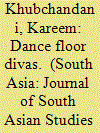

|
|
|
|
|
| Summary/Abstract |
Tracing his encounters with one particular song during fieldwork on queer nightlife in Bangalore, the author argues for the usefulness of ethnography as a critical method for studying dance and other modes of fun, play and pleasure in South Asia. He argues that ethnography’s many modes (co-performance, interview, observation, auto-ethnography) evidence how expressive practices integrate into the multiple strata of everyday life and political-economy, and how these cultural expressions facilitate inventions of new selves and worlds. While popular, improvised and social dances are challenging to study given their ephemerality, ethnography deepens our understanding of them and allows us to engage in creative dialogue in fieldwork.
|
|
|
|
|
|
|
|
|
|
|
|
|
|
|
|
| 3 |
ID:
171300
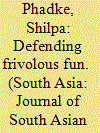

|
|
|
|
|
| Summary/Abstract |
Can fun be a serious politics in feminist struggles? That is the question that animates this paper. While claims for the economic and political participation of women have gained increasing legitimacy, the demand for fun may often be seen not just as frivolous, but also as undermining the seriousness of the feminist project itself. The paper engages with three feminist campaigns, two in India and one in Pakistan, that assert women’s rights to occupy the public for fun. The paper refutes critiques that suggest that feminist campaigns to claim public space in the city are illustrative of neo-liberal subjecthood and reflect the birth of new entrepreneurial selves. It also reflects on contemporary feminist debates in India around what counts as feminist, arguing that claims for fun might in fact be central to a feminist politics in the twenty-first century.
|
|
|
|
|
|
|
|
|
|
|
|
|
|
|
|
| 4 |
ID:
171304
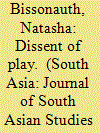

|
|
|
|
|
| Summary/Abstract |
Sa’dia Rehman’s Lotah Stories was an art installation that was exhibited in the bathrooms of Queens Museum of Art in New York during the 2005 Fatal Love show, the first exhibition on South Asian American art in a major venue. Given its unusual placement outside the white cube, one’s encounter with Lotah Stories is jarring. Moreover, Rehman’s crass subject matter incites carnivalesque laughter. This article argues that Rehman’s aesthetics give form to the dissent of play; by situating Rehman within the age of identity art and the emergence of South Asian diasporic art from the 1990s onwards, I maintain that attention to play as a political aesthetic can reshape the way we see difference.
|
|
|
|
|
|
|
|
|
|
|
|
|
|
|
|
| 5 |
ID:
171301
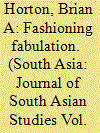

|
|
|
|
|
| Summary/Abstract |
India’s ongoing legal movement to decriminalise ‘gay sex’ has been witness to the simultaneous sanitisation of queer spaces. From Pride parades declaring ‘no nanga naach, no flamboyance’ to quotidian policing of excessive dress and gestures, there is a growing emphasis on respectability that stages queerness in the private rather than the public domain. The good homosexual subject is increasingly at odds with public gestures, performances and dresses that might seem too excessive, too flamboyant, perhaps too queer. But what might it mean to sit with the bawdy gestures enacted by kothi, hijra and MSM persons in Prides, in offices, in public spaces and in daily life? This essay makes a case for theorising the fabulousness of gender and sexual minorities in India, pushing homosexuality beyond the registers of legality and epidemiology. By examining the political implications of excessive and risky aesthetic practices, it argues that what is at stake is not only a centring of aesthetics in larger considerations of queer politics, but also the larger work of fabulation: the reinvention of what meanings queer subjectivity can take on in public spaces in India.
|
|
|
|
|
|
|
|
|
|
|
|
|
|
|
|
| 6 |
ID:
171297
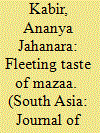

|
|
|
|
|
| Summary/Abstract |
Through a methodology that I term ‘embodied philology’, I trace a genealogy of mazaa as an understanding of enjoyment calibrated through the indices of taste and time. Using this genealogy to mark out an ‘alegropolitics’, or a politics of happiness, I extract its political potential in two ways: first, by assessing it through scholarship on the archive, repertoire, and what Spanish calls sabor, and, second, by applying these ideas, gleaned largely through scholarship from Latin America, to the assessment of Bollywood’s masala repertoire and film star Govinda’s role therein. Govinda’s subscription to a Bhojpuri performativity leads me to relocate mazaa within a decolonising agenda for pleasure formed through transnational and cross-border communities united by an embodied memory of collective enjoyment. A vignette from the 2018–19 Kochi-Muziris Biennale allows me to demonstrate how such memory may be activated to transform the present.
|
|
|
|
|
|
|
|
|
|
|
|
|
|
|
|
| 7 |
ID:
171295
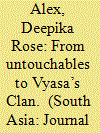

|
|
|
|
|
| Summary/Abstract |
This article examines the processes involved in the creation of a caste community called the Dheevaras in the South Indian state of Kerala in the early twentieth century. Although deemed an untouchable caste, the Dheevaras contested their untouchable status through various myths and histories, and this contestation was reflected in the Dheevara reform movement’s continuities with and departures from mainstream Hinduism and the caste system. While Dheevara reformers advocated a mainstream Hindu identity and claimed an honoured past for the community, they challenged Sanskritic Hinduism in defending the occupation of fishing. The reformers, however, strictly followed upper-caste Hindu patriarchal norms when imagining Dheevara womanhood, making women the bearers of caste honour.
|
|
|
|
|
|
|
|
|
|
|
|
|
|
|
|
| 8 |
ID:
171306


|
|
|
|
|
| Summary/Abstract |
Clothing and fashion play a prominent part in the presentation of key female characters in Indian television family dramas, referred to as saas-bahu serials.1 The purposeful sartorial branding of the characters is in touch with, as well as influencing, popular fashion off screen, which in turn further impacts the success of these serials. Geared towards daily viewership, such fashions remain excluded from serious consideration by the local and global fashion press that reduces them to guilt-inducing, style-less faux pas. However, through illustrating the innovation evident in the design of saas-bahu costumes, this article provides a framework and rationale for validating such instances of sartorial pleasure as well as recognising how these fashions have brought to the fore a previously unseen global network of fashion producers and consumers who are otherwise underrepresented in popular fashion media.
|
|
|
|
|
|
|
|
|
|
|
|
|
|
|
|
| 9 |
ID:
171294


|
|
|
|
|
| Summary/Abstract |
Deepak Unnikrishnan’s debut text, Temporary People, attempts to explore certain vulnerabilities and anxieties of transience that accompany emigrants to the Gulf Cooperation Council countries, where citizenship is not an option. By representing one of the largest Gulf diaspora in contemporary history—the Keralan emigrants or pravasis—as spectral figures and as absence-presences that signal a non-present presence in the Gulf, Unnikrishnan’s book attempts to retrieve and register their occulted histories on the Gulf landscape. In particular, this article explores how, by creating a Keralan Gulf-pravasi spectre, Unnikrishnan critically engages with a more varied version of Gulf diasporic experience and, therefore, a more complex definition of emigration itself.
|
|
|
|
|
|
|
|
|
|
|
|
|
|
|
|
| 10 |
ID:
171299
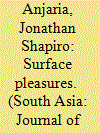

|
|
|
|
|
| Summary/Abstract |
There has been a resurgence of recreational cycling in Mumbai, as elsewhere in India, since the early 2010s. A significant reason for the new popularity of cycling has to do with the immersion in the urban landscape that it offers; people are attracted by the pleasures of the embodied experiences of cycling as well as interactions with the varied communities of cyclists with whom they share the road. This paper shows how surfaces matter both materially and metaphorically in opening new possibilities for understanding fun, recreation and pleasure. Whereas in critical urban studies and related fields, surface often connotes superficiality or a cover over the real, I argue that attention to surfaces and its pleasures is what enables people to emphasise the productive possibilities of ‘convivial alliances’ across differences and to promote an agenda for sustainable transportation politics that goes beyond infrastructure building.
|
|
|
|
|
|
|
|
|
|
|
|
|
|
|
|
| 11 |
ID:
171296
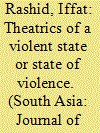

|
|
|
|
|
| Summary/Abstract |
This article engages with the subjective experiences of violence that have been written out of the histories of Partition in Kashmir. By reading the official archives ‘along the archival grain’, and by invoking the ‘small voice of history’ through memoirs (which have mostly remained untapped), this article attempts to highlight multiple experiences of Partition in the state. While the ‘tribal invasion’ of Kashmir has become the primary Indian nationalist trope in writing histories of the violence of 1947, the ‘communal violence’ which engulfed Jammu province has been treated as ‘someone else’s history—or even, not history at all’. Such narratives emphasise the political nature of violence in the state in 1947, presenting it as an exceptional space which remained above, as opposed to implicated in, the communal violence. In the case of ‘partition violence’ in Kashmir, I argue one cannot separate the political from the ‘communal’ and vice versa. An analysis of the violence in Jammu province allows one to understand the many ways in which the entanglement of the two played out against the backdrop of Kashmir’s contested accession.
|
|
|
|
|
|
|
|
|
|
|
|
|
|
|
|
| 12 |
ID:
171305


|
|
|
|
|
| Summary/Abstract |
Scholars of Indian cultural history have neglected the topic of alcohol and drinking, instead mostly emphasising a discourse of abstinence. Yet many Sanskrit technical and literary texts of the first through the early second millennium CE describe drinking in a positive light. There, drink is presented as a vital accessory for pleasure: drink is tasty, drink enhances the senses, loosens inhibitions and is associated with the enjoyment of sex for both women and men. The drinker is also an entertaining spectacle. Even those who abstained for religious reasons could savour the pleasures of drink as presented in poetry. Thus, within certain Sanskrit discourses that were presumably produced and used by an (unfortunately vaguely defined) educated elite through the later first and early second millennium CE, the multifaceted pleasures of drink are quite often celebrated. It is only by using a restricted archive that one would conclude that attitudes to drink among those who consumed Sanskrit texts in the early medieval period were largely negative.
|
|
|
|
|
|
|
|
|
|
|
|
|
|
|
|
| 13 |
ID:
171302
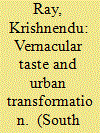

|
|
|
|
|
| Summary/Abstract |
The pleasure of street food provides an opening into the politics and poetics of vernacular taste. Mazaa in cheap viands such as chaat, kebabs and vada pao has the potential to decolonise the palatal and philosophical expectations of gastronomy that are dominant today. Viewed from the bottom up, much street food is a study of mazaa and poor people’s livelihoods in a matrix of cross-class interests. This paper takes the case of popular food cultures—based on a large multi-city collaborative project—to explore questions of liveliness of cities and epistemologies of fun. What are the best ways to register a bottom-up, sensuous materiality and sociability in theory without falling into the gourmand’s trap of pure apolitical pleasure?
|
|
|
|
|
|
|
|
|
|
|
|
|
|
|
|
|
|
|
|
|